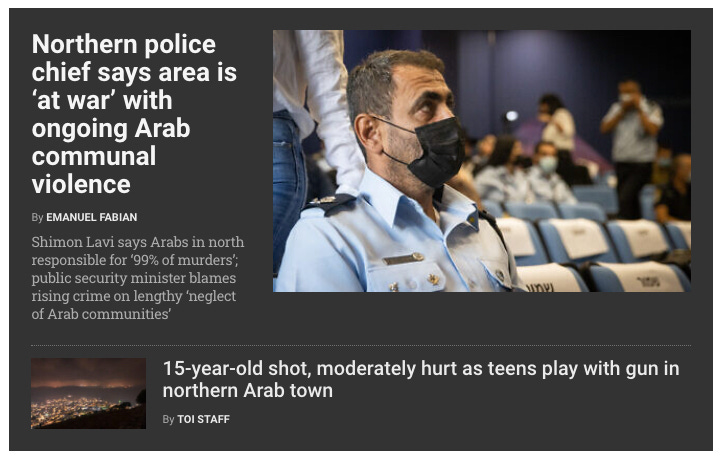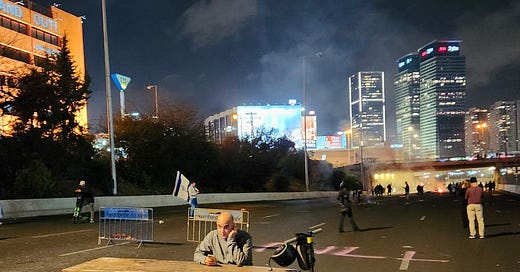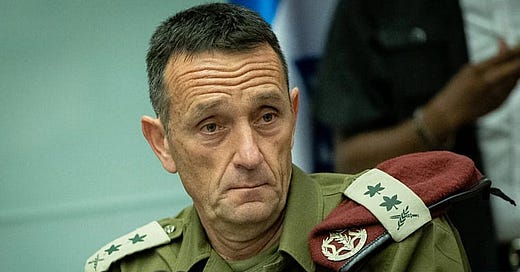

Discover more from Israel from the Inside with Daniel Gordis
"You're only here by mistake. Ben-Gurion should have thrown you all out."
Prime Minister Bennett said yesterday, "We're losing the country."
Staying abreast of the utterances of MK Bezalel Smotrich, leader of the National Religious Party, isn’t for the faint of heart. We were reminded of that again last week, when in response to heckling over a proposed law from some Arab lawmakers in the plenum, Smotrich erupted:
I’m not speaking to you, anti-Zionists, terror supporters, enemies. You’re here by mistake. It’s a mistake that Ben-Gurion didn’t finish the job and didn’t throw you out in 1948.
He was speaking, of course, not to Syrians or Palestinians, but to Israeli citizens, democratically elected to the Knesset. But they were Israelis, he told them, only by mistake. If Ben-Gurion had done things right, he said, they’d have been long gone.
Few non-extremists were terribly happy (nor were many surprised), but it was interesting that Smotrich’s remarks didn’t unleash a firestorm. It might be that Israelis have other things on their minds. But it also might be that—even if they won’t say it out loud— many Israelis are not so sure he’s wrong.
For whatever Israelis may think of Smotrich, most are very worried about a deeply entrenched ethic of crime and murder in the Arab community. The covers of two magazine sections, both from this weekend’s papers (one right of center, the other center or slightly left), are a perfect illustration.

Though Arabs constitute about 20% of Israel’s population, Arab murder of other Arabs accounts for some 70% of all homicides in Israel. The murder rate in the Arab community has risen by 50% in the past four years. In 2019, 89 Israeli Arabs were murdered, compared with 36 Jews. In 2020, the number rose to 113, and at this point in 2021, there have been more than 100.
Tribal and family feuds and score-settling account for many of these murders. Some are also killings of women by their own family, in numerous cases for “family honor”—sex outside of marriage, etc. In very few cases do the murders of Arab result in indictments, much less convictions. Police claim that few Arabs are willing to cooperate in investigations; the police are even demoralized when there are convictions, for the sentences are surprisingly light.
For those of us who read the Israeli news each day, the reports of murder in the Arab community every few days has become numbing, and heartbreaking. In June, a couple and their daughter were killed, apparently in retaliation as part of an internal feud inside a well-known crime family. In August, Anas al-Wahwah, 18, a student and volunteer for the Israeli ambulance corps, Magen David Adom, was shot in Lod while sitting in a car, waiting for his mother. In August, Sahar Ismael, an adviser to Education Minister Yifat Shasha-Biton and No. 17 on the New Hope Party’s Knesset list, was shot dead in the Galilee town of Rameh. He was apparently killed because he intended to use his influence in government to fight the town’s crime gangs.
This month has been no different. On October 9, Issam Salti, a 24-year-old newlywed, was shot and killed by a stray bullet in Illut. The bullet was apparently fired during a firefight between two families in the village, in which Salti was entirely uninvolved. On October 14, Jihad Hammoud was killed in a drive-by shooting while out running with friends in Deir Hanna.
According to a 2020 Knesset report, there are some 400,000 illegal weapons circulating in Israel, the vast majority of them in the Arab community. Most of those weapons—which include not only pistols but automatic weapons such as M-16’s—are believed to have been stolen from the army or the police. But there are other sources, as well. In the West Bank there are underground factories for the manufacture of weapons or the transforming of air guns (not illegal) into lethal weapons. Smuggling from outside Israel is also a challenge. Using social media, Israeli Arabs can easily contact people in Lebanon who are all too happy to supply weapons for money; the weapons are commonly wrapped in protective cloth or packaging, and at appointed times, tossed over the border fence at a pre-arranged location.
In some parts of the country, the crime wave has begun to frighten Jews. One major concern is the free rein that many Bedouins have in the Negev (hence the “No Man’s Land” sign in this week’s paper). Young Jewish women in many places in the Negev, including in big cities, are afraid to go out at night. They go out as pairs or in groups, and even that is not enough. Young Bedouin men in Land Rovers and other expensive cars follow them, taunt them, ask for their numbers. Occasionally, things get much worse. Israeli Jews living in Jewish towns in the Negev report hearing shooting on a regular basis, the bullets often flying into their Jewish neighborhoods. Theft is rampant; on a new highway in the Negev, the Bedouin took down all the light-poles and blocked the highway during May’s rioting.
As for what to do, no one has any great ideas. Even explanations of the problem are contradictory. Some people explain that the crime is due in large measure to poverty and lack of opportunity (that Arab men are unemployed at a much higher rate is beyond denial, though some of that stems from the fact that many of them do not complete high school). Others, though, believe that much of the crime stems from the growing middle class in Arab communities, with young people trying to angle in on the money.
The police have predictably promised more officers, with plans to add 200 this coming year and another 300 the year after. No one is terribly optimistic that that will make a dent. In the Arab community, Arabs themselves report, carrying a weapon is now seen as a status symbol that few young men are willing to forego, and as a result, it has also become necessary for self-protection. Not surprisingly, 60% of Israeli Arabs report that they feel no sense of personal security at large Arab gatherings. A campaign called “Arab Lives Matter” has emerged; unlike the parallel in the United States, rank and file Arabs are begging for more police involvement.
Arabs are dying, and Jews are frightened. Prime Minister Naftali Bennett thus realizes that he has an explosive situation on his hands, and this week said at a cabinet meeting, “We’re losing the country.” In response to a left-wing Jewish MK’s objections to increasing law enforcement’s powers, Hamed Amar, an Israeli-Arab lawmaker retorted, “we’ve completely lost the rule of law.” Issawi Frej, an Israeli-Arab minister, similarly responded, “As far as I’m concerned, the CIA should come in if that’s what it takes to restore security.”
Bennett has supported a proposal to enlist the Shin Bet (Israel’s vaunted Internal Security Service) in the fight against crime. But many have objected, worried that that would encroach on Arabs’ civil liberties. Earlier this month, it was announced that the army would take part in the drive to confiscate illegal weapons, but the IDF backtracked almost immediately, saying that it would simply work harder to prevent the theft of weapons from bases (in other words, it would do nothing). When the Ministry of Justice promised to pass a series of laws that would give law enforcement greater leeway in cracking down on illegal weapons, Arab lawmakers responded that the proposed guidelines were undemocratic.
How quickly will change come? One doesn’t need to be an Israeli sociologist or criminologist to know what the smart bet is. What is certain, though, is that more and more Jews are getting nervous, some even panicked. Hence, the two magazine sections of a few days ago.
Which brings us back to Bezalel Smotrich. One might be tempted to say, “Well, however worrisome the crime problem among Israeli Arabs is, that expulsion idea is a right-wing fringe thing. Normal people don’t speak that way.”
Yet matters are not that simple.
Consider Professor Benny Morris, one of Israel’s most highly regarded historians, then long associated with the left and the author of such books as Righteous Victims: A History of the Zionist-Arab Conflict, 1881-2001 and The Birth of the Palestinian Refugee Problem, 1947-1949. (I also highly recommend Prof. Morris’ superb 1948: A History of the First Arab-Israeli War.) In 2004, towards the end of the Second Intifada, he gave an interview to Haaretz which shocked virtually everyone. Here is a very small section:
... I think [Ben-Gurion] made a serious historical mistake in 1948. Even though he understood the demographic issue and the need to establish a Jewish state without a large Arab minority, he got cold feet during the war. In the end, he faltered.
I’m not sure I understand. Are you saying that Ben-Gurion erred in expelling too few Arabs?
If he was already engaged in expulsion, maybe he should have done a complete job. I know that this stuns the Arabs and the liberals and the politically correct types. But my feeling is that this place would be quieter and know less suffering if the matter had been resolved once and for all. If Ben-Gurion had carried out a large expulsion and cleansed the whole country – the whole Land of Israel, as far as the Jordan River. It may yet turn out that this was his fatal mistake. If he had carried out a full expulsion – rather than a partial one – he would have stabilized the State of Israel for generations. …
In his place, would you have expelled them all? All the Arabs in the country?
…. Yes. The non-completion of the transfer was a mistake. …
Including the expulsion of Israeli Arabs?
The Israeli Arabs are a time bomb. Their slide into complete Palestinization has made them an emissary of the enemy that is among us. They are a potential fifth column. In both demographic and security terms they are liable to undermine the state. So that if Israel again finds itself in a situation of existential threat, as in 1948, it may be forced to act as it did then. If we are attacked by Egypt (after an Islamist revolution in Cairo) and by Syria, and chemical and biological missiles slam into our cities, and at the same time Israeli Palestinians attack us from behind, I can see an expulsion situation. It could happen. If the threat to Israel is existential, expulsion will be justified. …
Benny Morris, have you joined the right wing?
No, no. I still think of myself as left-wing. I still support in principle two states for two peoples.
But you don’t believe that this solution will last. You don’t believe in peace.
In my opinion, we will not have peace, no.
Today, Benny Morris’ worries in 2004 are those of many Israeli Jews—even if they know that saying so is not politically correct.
So where does that leave us? Thankfully, some people are not despairing. Take for example, an organization called Atidna, which is devoted to rethinking Arab citizenship in Israel.
In a dramatic shift, Atidna is not taking what has been the common approach of Arabs opposing Israel’s being a Jewish state (which is why they have long failed to get any meaningful traction with rank-and-file Jewish Israelis), but rather, working for Arab advancement within a Jewish state.
Their goal, their website says, is “To build pragmatic, courageous and representative Arab leadership that will work to advance the interests of the Arab public, successfully integrate into Israeli society, in so doing strengthen the state of Israel for all of its citizens.” Those with a feel for Israeli Arab discourse can sense what a dramatic change a sentence like that represents.
On Thursday, we will post our interview with Dalia Fadila, a fascinating, impressive and courageous Arab Israeli woman, a former college president and one of the founders of Atidna. Stay tuned.
Though Atidna is just getting started, its work so far is very impressive. Can it and other projects like it make a difference? Anyone who cares about the future of Israel must hope that it, or something like it, will. For as long as Israelis see massive waves of crime in the Arab sector, many Israelis will be more more afraid of Israeli Arabs than they are of enemies across the border. And the longer that is true, the less the Bezalel Smotriches of the world will sound outrageous.
In the minds of most Israelis, Iran still feels very far away. The Galilee and the Negev, they know, are not. And fear, we all know, rarely leads a society to anyplace good.
It is exceedingly difficult not to be impressed with Dalia Fadila. The founder of Q Schools: Education, Consultation & Development, an institution for promoting quality education in the Arab society in Israel, she also served as President of the College of Engineering and Science, leading it from a small technological institute into a leading academic and professional college for qualifying engineers in the Arab community in Israel.
Prior to that, in the period between 2000- 2011 Dr. Fadila, acted as the Academic Director of Al Qasemi Teacher Training College. As a member of the college's leadership, she helped transform it from a religious seminary into an academic institution.
In our conversation, Dr. Fadila spoke about her take on Arab life in Israel, Arab futures in a Jewish state, the transformation that she believes is possible, and her newest project, Atidna, which she hopes can make that change real.
We’ll post that podcast for subscribers this Thursday.
Our twitter feed is here; feel free to join there, too.
















